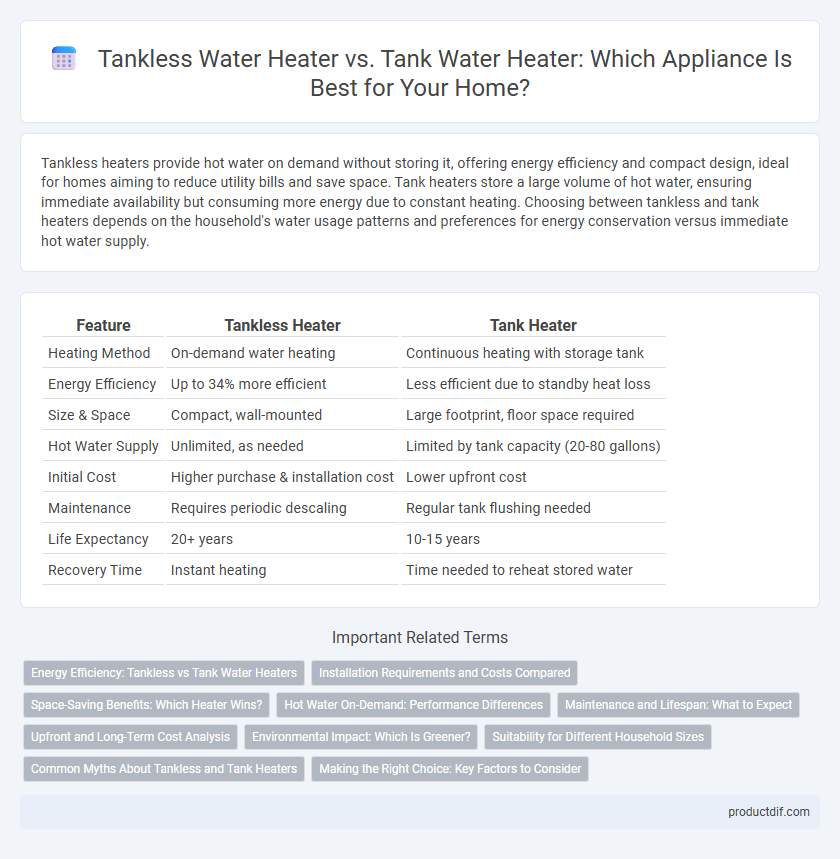Tankless heaters provide hot water on demand without storing it, offering energy efficiency and compact design, ideal for homes aiming to reduce utility bills and save space. Tank heaters store a large volume of hot water, ensuring immediate availability but consuming more energy due to constant heating. Choosing between tankless and tank heaters depends on the household's water usage patterns and preferences for energy conservation versus immediate hot water supply.
Table of Comparison
| Feature | Tankless Heater | Tank Heater |
|---|---|---|
| Heating Method | On-demand water heating | Continuous heating with storage tank |
| Energy Efficiency | Up to 34% more efficient | Less efficient due to standby heat loss |
| Size & Space | Compact, wall-mounted | Large footprint, floor space required |
| Hot Water Supply | Unlimited, as needed | Limited by tank capacity (20-80 gallons) |
| Initial Cost | Higher purchase & installation cost | Lower upfront cost |
| Maintenance | Requires periodic descaling | Regular tank flushing needed |
| Life Expectancy | 20+ years | 10-15 years |
| Recovery Time | Instant heating | Time needed to reheat stored water |
Energy Efficiency: Tankless vs Tank Water Heaters
Tankless water heaters provide superior energy efficiency by heating water on demand, eliminating the standby heat loss associated with traditional tank heaters. Tank water heaters continuously maintain a reservoir of hot water, which results in higher energy consumption due to heat loss from storing water. According to the U.S. Department of Energy, tankless models can achieve energy savings of 24% to 34% for homes using 41 gallons or less of hot water daily.
Installation Requirements and Costs Compared
Tankless water heaters typically require professional installation due to their need for upgraded electrical systems or gas lines, which can increase initial costs by 20-40% compared to traditional tank heaters. Traditional tank water heaters have simpler installation requirements, often connecting directly to existing plumbing, resulting in lower upfront installation expenses. However, the compact size of tankless heaters saves space and may reduce long-term operational costs despite the higher initial investment.
Space-Saving Benefits: Which Heater Wins?
Tankless water heaters offer superior space-saving benefits compared to traditional tank heaters by eliminating the need for bulky storage tanks, allowing installation in compact areas like closets or under sinks. Tank heaters require significant floor space due to their large reservoirs, making them less ideal for small homes or apartments. The compact design of tankless models maximizes usable living space and enhances overall appliance efficiency.
Hot Water On-Demand: Performance Differences
Tankless water heaters provide hot water on-demand by heating water instantly as it flows through the unit, delivering continuous supply without the limitations of storage capacity. Traditional tank heaters store a finite amount of preheated water, leading to potential depletion during peak usage and slower recovery times. Performance differences highlight tankless systems' energy efficiency and space-saving benefits compared to tank heaters' initial lower cost and consistent delivery for large household demands.
Maintenance and Lifespan: What to Expect
Tankless water heaters generally require less maintenance than traditional tank heaters, as they do not accumulate sediment that can cause corrosion or reduce efficiency. The lifespan of tankless heaters typically ranges from 20 to 30 years, outperforming tank heaters which usually last around 10 to 15 years. Regular descaling and filter cleaning are essential for tankless units to maintain optimal performance and extend durability.
Upfront and Long-Term Cost Analysis
Tankless water heaters typically have higher upfront costs, ranging from $1,000 to $3,000 including installation, compared to traditional tank heaters that cost between $300 and $700. Long-term cost savings with tankless heaters reach up to 30% on energy bills due to their on-demand heating technology, while tank heaters incur higher energy expenses from continuously maintaining water temperature. Maintenance and replacement expenses for tank heaters are often more frequent, increasing total lifetime costs compared to the durable components of tankless units.
Environmental Impact: Which Is Greener?
Tankless water heaters reduce energy consumption by heating water on demand, leading to lower greenhouse gas emissions compared to traditional tank heaters that maintain a constant water temperature. Tank heaters require more energy to keep stored water hot 24/7, resulting in higher standby heat loss and increased carbon footprint. Choosing a tankless water heater contributes to a greener environment by minimizing energy waste and promoting sustainability.
Suitability for Different Household Sizes
Tankless heaters provide on-demand hot water, making them ideal for small to medium households with moderate water usage, as they prevent energy waste by heating only when needed. Traditional tank heaters store a fixed volume of hot water, better suiting larger families or households with high simultaneous demand, ensuring immediate availability. Choosing between the two depends on factors like household size, water consumption patterns, and installation space.
Common Myths About Tankless and Tank Heaters
Many consumers believe tankless heaters provide unlimited hot water, but their output depends on flow rate and may require multiple units for larger homes. Another common myth is that tank heaters waste energy constantly, whereas modern insulated tanks minimize heat loss effectively. People often assume installation costs for tankless systems are prohibitively high, yet long-term energy savings frequently offset the initial investment.
Making the Right Choice: Key Factors to Consider
Choosing between a tankless heater and a tank heater depends on factors such as energy efficiency, installation costs, and hot water demand. Tankless heaters provide on-demand hot water and higher energy savings, while tank heaters offer lower upfront costs and consistent water supply for larger households. Evaluating household size, usage patterns, and budget ensures an optimal decision tailored to specific heating needs.
Tankless heater vs Tank heater Infographic

 productdif.com
productdif.com